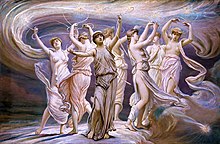Taygete
| Taygete | |
|---|---|
The Pleiad Nymph | |
| Member of the Pleiades | |
 The Pleiades by Elihu Vedder | |
| Abode | Mt. Cyllene on Arcadia, later Mt. Taygetos on Laconia |
| Personal information | |
| Parents | (a) Atlas and Pleione or Aethra (b) Agenor |
| Siblings |
(a) Hyades |
| Consort | (1) Zeus(2) Lacedaemon |
| Children | (1) Lacedaemon and Eurotas(2) Himerus |
In Classical
potnia theron, "Mistress of the animals", with its likely roots in prehistory. Mount Taygetos in Laconia, dedicated to the goddess, was her haunt.
| Greek deities series |
|---|
| Nymphs |
The Taygetus mountain on the Peloponnese was named after her.[1]
Mythology
As he mastered each of the local nymphs one by one, Olympic Zeus pursued Taygete, who invoked her protectress Artemis. The goddess turned Taygete into a
Karl Kerenyi
points out (The Heroes of the Greeks) "It is not easy to differentiate between the divine beast, the heroine and the goddess".
According to Pausanias (3.1.2, etc.) Taygete conceived Lacedaemon, the mythical founder of Sparta, through Zeus, and Eurotas. Pausanias noted, at Amyclae, that the rape of Taygete was represented on the throne.[5]
According to Pseudo-Plutarch,[6] Taygete was the wife of Lacedaemon, sometimes referred to as Sparta, whose name was given to the city of Sparta. Their son was named Himerus.
In a rare variant of the myth, Taygete was called the daughter of Agenor.[7]
Notes
- ^ Pseudo-Plutarch, De fluviis, 17
- Deer (mythology)
- ^ Emmet Robbins, "Heracles, the Hyperboreans, and the Hind: Pindar, "OL." 3", Phoenix 36.4 (Winter 1982:295-305) 302f notes that the association of Artemis with Orthia = Orthosia was under way in the sixth century BCE.
- ^ Robbins 1982:295-305.
- ^ Pausanias, 3.18.10
- ^ Pausanias (1918). "3.1.2". Description of Greece. with an English Translation by W.H.S. Jones, Litt.D., and H.A. Ormerod, M.A., in 4 Volumes. Cambridge, MA; London. At the Perseus Project.
- ^ Dictys Cretensis, 1.9
References
- Ruck, Carl A.P., and Danny Staples, 1994. The World of Classical Myth (Carolina Academic Press)
- Harry Thurston Peck, Harpers Dictionary of Classical Antiquities, 1898. Online version at the Perseus Digital Library: "Taygete"
- Robbins, Emmet. "Heracles, the Hyperboreans, and the Hind: Pindar, "OL. 3", Phoenix 36.4 (Winter 1982), pp. 295–305.
External links
 Media related to Taygete (Pleiad) at Wikimedia Commons
Media related to Taygete (Pleiad) at Wikimedia Commons
